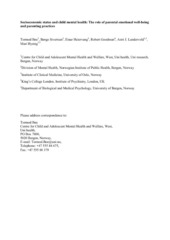Socioeconomic status and child mental health: The role of parental emotional well-being and parenting practices
Bøe, Tormod; Sivertsen, Børge; Heiervang, Einar; Goodman, Robert; Lundervold, Astri Johansen; Hysing, Mari
Journal article
Draft
Permanent lenke
https://hdl.handle.net/1956/7699Utgivelsesdato
2013Metadata
Vis full innførselSamlinger
Originalversjon
https://doi.org/10.1007/s10802-013-9818-9Sammendrag
Objective: This study examined the role of parental emotional well-being and parenting practices as mediators of the association between familial socioeconomic status (SES) and child mental health problems. Method: The sample included 2,043 5th-7th graders (50.7% female) participating in the second wave of the Bergen Child Study. Children completed the Strengths and Difficulties Questionnaire, parents reported family economy and education level, emotional well-being (measured with the Everyday Feelings Questionnaire), and the use of disciplinary and affirmative parenting practices (measured using the Family Life Questionnaire). Results: Path analyses were conducted to examine the associations between SES and externalizing and internalizing problems. Results supported a model where family economy was associated with externalizing problems through parental emotional well-being and parenting practices, whereas maternal education level were associated with externalizing problems through discipline. Direct association between paternal education levels and externalizing problem was not mediated by parenting. For internalizing problems, we found both direct associations with family economy and indirect associations with family economy through parental emotional well-being and parenting. Conclusions: The results suggest that parental emotional well-being and parenting practices are two potential mechanisms through which low socioeconomic status is associated with child mental health problems.
